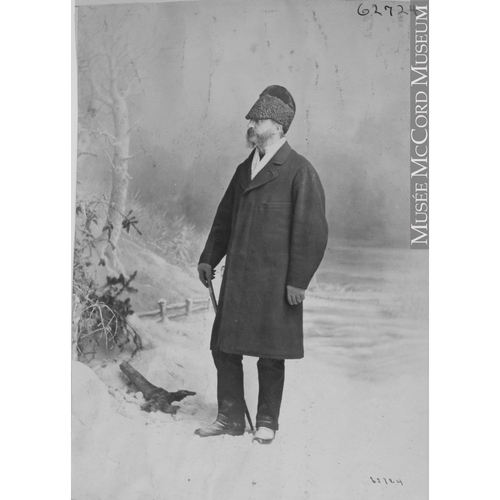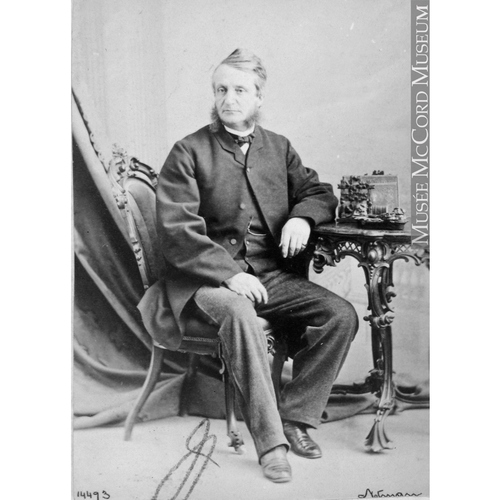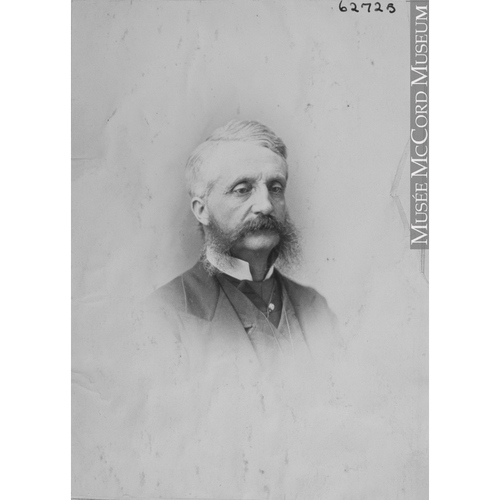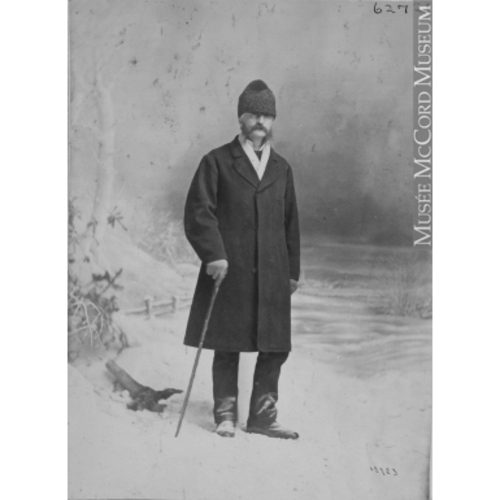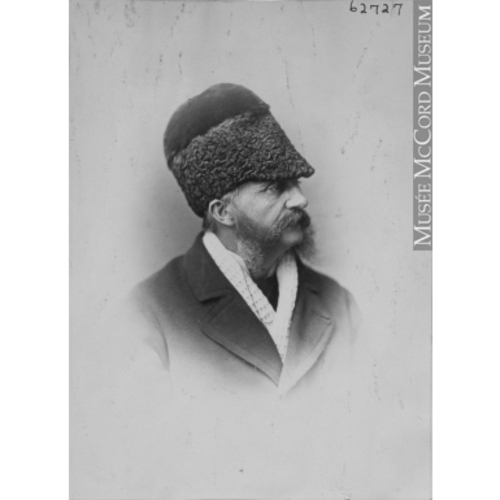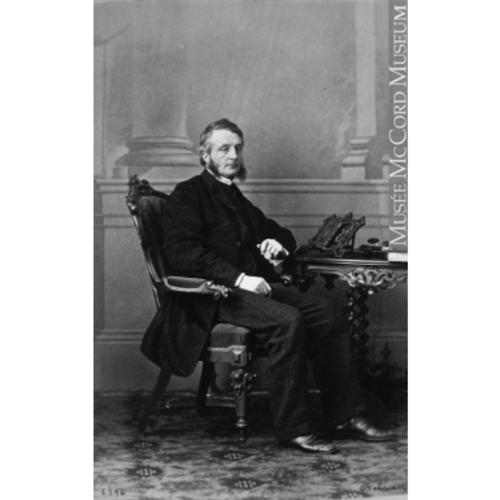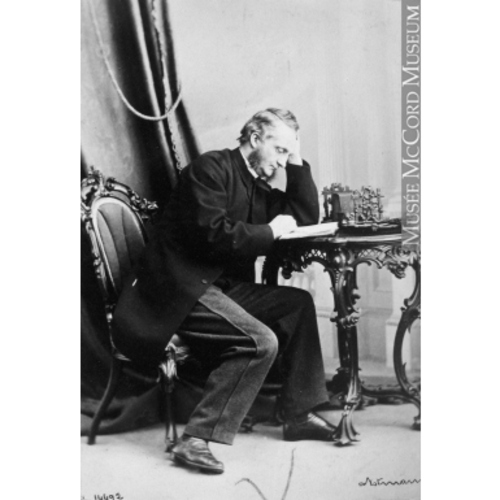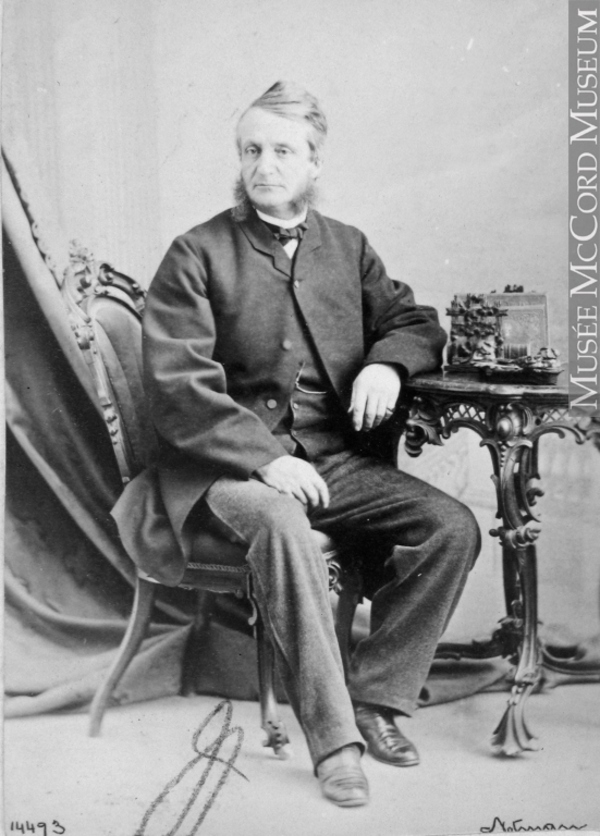
Source: Link
BECHER, HENRY CORRY ROWLEY, lawyer, politician, and author; b. 5 June 1817 in London, England, youngest son of Captain Alexander Becher, rn, and Frances Scott; m. first 27 Oct. 1841 Sarah Evanson Leonard (d. 1864), and they had eight children; m. secondly in 1874 Caroline Robertson, née Street; d. 6 July 1885 at Sidcup, England.
Henry Corry Rowley Becher immigrated to London, Upper Canada, in 1835. He began articling with John Wilson* in 1836 and was appointed registrar of the Surrogate Court of Middlesex County in 1839. Becher was admitted an attorney on 2 Nov. 1840 and was called to the bar on 2 Aug. 1841. He was elected a bencher of the Law Society of Upper Canada in 1853 and lectured a term at Osgoode Hall, Toronto, in 1856; the same year he was appointed qc on 4 October.
By the 1850s Becher was one of the busiest lawyers in the London area. Solicitor for Colonel Thomas Talbot* during the early 1850s, in 1852 he drew up the will that bequeathed most of the colonel’s remaining estate to George Macbeth*, thereby causing an uproar in Talbot’s family. Becher was also the municipal solicitor for London from 1849 to 1853. In April and May of 1855 alone he handled the crown business at the assizes at St Thomas, London, and Chatham, as well as submitting 27 civil briefs at St Thomas and 35 at London. In 1857 he became the solicitor of the Gore Bank and a director of the Great Western Railway. He had done legal business with the railway since 1852 but had refused the job of solicitor, and the £1,000 per annum plus staff that accompanied it. In the 1870s Becher was again involved in a celebrated legal controversy which involved the settlement of an estate. The family of George Jervis Goodhue* objected to the stipulation in Goodhue’s will that the majority of the estate was not to be distributed until after the death of his wife. The family managed to have a private bill passed in the Ontario legislature which supported their claims. Becher, however, refused to relent and on appeal his position was supported by a panel of nine judges. The estate was not distributed until after the death of Mrs Goodhue in 1880.
Becher’s political career was almost the antithesis of his successful legal practice. He sat on the town council of London from 1850 to 1854 but his attempts to enter provincial politics were unsuccessful. In 1857 he failed to obtain the Conservative nomination in London which went to John Carling*, who later introduced the bill for the Goodhue family. In 1860 a by-election for the Legislative Assembly in Middlesex East promised to be an easy victory for the Conservatives. Becher managed to obtain the nomination for the Conservatives but Maurice Berkeley Portman, an unsuccessful candidate for the nomination, threw his support behind Francis Evans Cornish* who was running as a Conservative Orangeman. This split in Conservative forces allowed the Reformer to carry the riding. In 1861 Becher and Portman again vied for the Conservative nomination. Becher withdrew, after the intervention of John A. Macdonald*, with the promise of Portman’s support in the election for the Legislative Council for Malahide. Portman won his contest but did not provide the expected support to Becher who lost to Elijah Leonard* Jr. After this defeat Becher never ran for public office but remained an active party organizer.
Becher was the victim of local Conservative rivalries, nominating conventions which he considered “immoral and democratic,” and of his own reserved and proper manner. Although he was generally acknowledged as the most able candidate, the most polished speaker, and a man of “honor, intelligence and education,” the fact that he was a lawyer hurt him in the predominantly rural areas in which he ran. This issue became explicit in the contest with Leonard when Becher suggested that the manufacturer of farm implements should “stick to his plough points,” only to be met with the rejoinder that he should stick to his “law points.” In 1860 John A. Macdonald advised Becher to canvass vigorously and thoroughly. “Lay aside your high-heeled boots for a while and take to proof whiskey. You can become a Tee-totaller the moment you are elected.”
After giving up his political ambitions Becher made travel his major avocation. He crossed the Atlantic 20 times, made a number of trips to Florida, and travelled to Mexico in 1878; he wrote a book to assure people that Mexico was a good place to visit. His travels, however, confirmed his belief that Canada was the best place to live. Its people were “strong, hardy, energetic” because of the climate, God-fearing, and law-abiding. Its government was “the freest in the world” because it was “well understood and never lost sight of in practice, that the rights of men are equal.”
In 1880 he became a fellow of the Royal Geographical Society and in 1882 a barrister of the Inner Temple, London, England. By the time of his death he owned considerable land, some in northern Ontario but chiefly in London. The most valuable was the 13 acres surrounding Thornwood, his impressive residence, which in 1970 was declared an historic site.
H. C. R. Becher was the author of A trip to Mexico, being notes of a journey from Lake Erie to Lake Tezcuco and back . . . (Toronto, 1880), and his diary, edited by M. A. Garland and Orlo Miller, has been published in OH, 33 (1939): 116–43. Letters from John A. Macdonald to Becher are in the possession of Mrs A. V. Becher (London, Ont.), and some have been edited by E. H. Jones in “Some letters from John A. Macdonald to H. C. R. Becher, 1857–63,” Western Ontario Hist. Notes ([London]), 21 (1965), no.1: 26–33.
UWO, H. C. R. Becher papers. Macdonald, Letters (J. K. Johnson and Stelmack), I, II. “The Richard Airey-Henry C. R. Becher correspondence,” ed. M. A. Garland, Western Ontario Hist. Nuggets (London), 36 (1969). The Talbot papers . . . , ed. J. H. Coyne ([Toronto], 1909). London Free Press, 1857–63. Dominion annual register, 1885.
Cite This Article
Elwood H. Jones, “BECHER, HENRY CORRY ROWLEY,” in Dictionary of Canadian Biography, vol. 11, University of Toronto/Université Laval, 2003–, accessed January 1, 2026, https://www.biographi.ca/en/bio/becher_henry_corry_rowley_11E.html.
The citation above shows the format for footnotes and endnotes according to the Chicago manual of style (16th edition). Information to be used in other citation formats:
| Permalink: | https://www.biographi.ca/en/bio/becher_henry_corry_rowley_11E.html |
| Author of Article: | Elwood H. Jones |
| Title of Article: | BECHER, HENRY CORRY ROWLEY |
| Publication Name: | Dictionary of Canadian Biography, vol. 11 |
| Publisher: | University of Toronto/Université Laval |
| Year of publication: | 1982 |
| Year of revision: | 1982 |
| Access Date: | January 1, 2026 |


